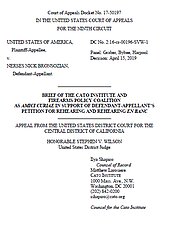A subsequently enacted law, 18 U.S.C. § 922(o), prevents the government from registering and accepting tax payments on new machineguns. So Bronsozian was charged and convicted of a felony for not paying a tax that the government would not allow him to pay. If that strikes you as odd, it’s probably because you’ve read the Constitution.
Our federal government is one of enumerated and therefore limited powers. When the government passes a law under its taxing power, it must pass a tax. A series of Supreme Court decisions tells us, quite reasonably, that in order for the government to pass a law as a tax, it must actually be a tax, as opposed to a penalty for conduct (recall the debate over Obamacare’s individual mandate/penalty/”tax”). An essential feature of a tax is that it generates revenue, and the tax Bronsozian was convicted of not paying has been forbidden by law from generating any revenue for more than 30 years. Yet the government still wants to lock people in federal prison for failing to pay it.
Bronsozian moved to dismiss his charge, arguing that § 5861(d) was not a constitutional tax, that charging him for nonpayment of a tax that was impossible to pay was a violation of his due-process rights, and other claims. The district court found for the government, citing a flawed circuit precedent that made a 180-degree reversal from established tax law. He is now appealing to the U.S. Court of Appeals for the Ninth Circuit, hoping to set the record straight.
Because the taxing power gives the government the authority to tax, not ban whatever conduct it sees fit, Cato, joined by Firearms Policy Coalition, has filed an amicus brief supporting Bronsozian. We argue that, as the Supreme Court has repeatedly found, that a tax must be a tax. For a government of enumerated powers to function, those powers must be clearly defined. The fact that a case involves guns—even unpopular guns—is not a reason to smudge the taxing power into a grant to do whatever the government wants. We also point out what we perceive to be a concerning departure from jurisprudence regarding Americans’ rights more broadly. By refusing to present an analysis of why the machineguns are beyond the scope of the Second Amendment, the courts are glazing over an important constitutional question. If a class of arms can be regulated nearly to the point of a categorical ban—which machineguns may well be—the American people deserve to at least know the constitutional justification.



